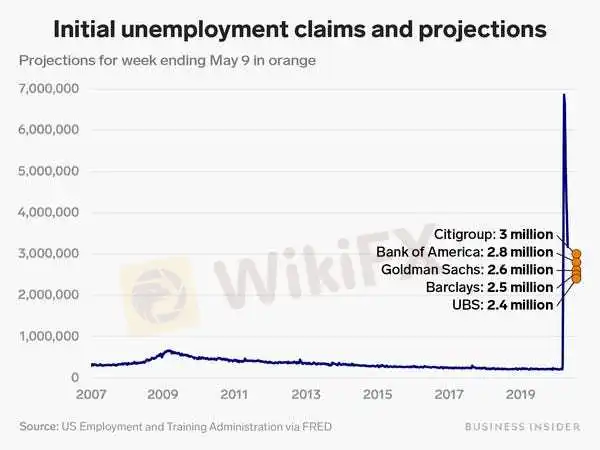简体中文
繁體中文
English
Pусский
日本語
ภาษาไทย
Tiếng Việt
Bahasa Indonesia
Español
हिन्दी
Filippiiniläinen
Français
Deutsch
Português
Türkçe
한국어
العربية
US jobless claims preview: Economists expect another week of decline - Business Insider
Abstract:"If the current rate of decline continues, claims will dip below 1M in the second or—more likely—third week of June," said economist Ian Shepherdson.
The median economist forecast for jobless claims in the week ending May 9 is 2.5 million, according to Bloomberg data.If Thursday's report from the Labor Department is near the estimate, it will mark another consecutive week of declining claims. It will also mean that more than 35 million Americans have been laid off in just eight weeks. “While there are glimmers of hope as a reopening tentatively gets underway, the damage wreaked on the economy will take a long time to repair,” said James Knightley, chief international economist at ING. Visit Business Insider's homepage for more stories. Economists expect that the number of Americans filing for unemployment fell again last week, yet remained elevated at a high level as coronavirus-induced layoffs continue.
The median economist estimate for jobless claims in the week ending May 9 is 2.5 million, according to Bloomberg data. If Thursday's report is near estimates, it will be an improvement from the previous week, when 3.2 million Americans filed for unemployment, according to the Labor Department.It would also mean that in eight weeks, more than 35 million Americans will have lost jobs amid the economic fallout caused by the coronavirus pandemic.

Business Insider/Andy Kiersz
Read more: MORGAN STANLEY: Buy these 20 stocks built to profit from a mounting inflation comeback that will alter the investing landscape
While dwindling weekly jobless claims are a step in the right direction, economists still point out that millions of Americans filing for unemployment benefits each week is unprecedented. Even in the worst week of the great recession, only 665,000 people filed a claim for unemployment. “If the current rate of decline continues, claims will dip below 1M in the second or—more likely—third week of June,” Ian Shepherdson, chief economist at Pantheon Macroeconomics, wrote in a note last week, adding that the level would still be above the worst week of the Great Recession.Continued high unemployment doesn't bode well for the US economic recovery. On Friday, the April jobs report showed that the US lost a record 20.5 million jobs during the month, and that the unemployment rate spiked to 14.7%, the highest since the Great Depression.Economists expect that report underestimated the true economic pain of sweeping lockdowns to contain the coronavirus pandemic, and that there still may be worse to come for the US economy even as some states start to reopen.
“While there are glimmers of hope as a reopening tentatively gets underway, the damage wreaked on the economy will take a long time to repair,” said James Knightley, chief international economist at ING. He continued: “Given ongoing social distancing for several more months, lingering consumer caution and the legacy of nearly 40 million jobs lost, we see little prospect of a V-shaped recovery. Even with additional fiscal support, the lost economic output may not be recouped until early 2023.”
Loading
Something is loading.
Disclaimer:
The views in this article only represent the author's personal views, and do not constitute investment advice on this platform. This platform does not guarantee the accuracy, completeness and timeliness of the information in the article, and will not be liable for any loss caused by the use of or reliance on the information in the article.
Read more

AUS GLOBAL partners with the United Nations to promote Global Sustainable Development
We are honored to share that AUS GLOBAL, as an invited guest of the United Nations forum on Science, Technology and Innovation (UNSTI), successfully completed the important mission of this event on June 20, 2024 at the Palais des Nations in Geneva, Switzerland.The forum brought together dignitaries and renowned business people from around the world to discuss important topics such as global fintech development and environmental protection.

2021 World Economic Outlook
The IMF projects that the global economy will shrink by 4.4% in 2020, followed by a 5.2% rebound in 2021, supporting a V-shaped recovery.

Will Indian Economy Go Short?
According to the latest data of the Reserve Bank of India (RBI), the country's forex reserves have surged $11,938 million to a fresh all-time high of $534,568 million for the week ended July 31.
Fed survey: The poorest Americans are being hit hardest by job loss - Business Insider
"This reversal of economic fortune has caused a level of pain that is hard to capture in words," said Fed Chair Jerome Powell.
WikiFX Broker
Latest News
ASIC Sues Binance Australia Derivatives for Misclassifying Retail Clients
Geopolitical Events: What They Are & Their Impact?
Top 10 Trading Indicators Every Forex Trader Should Know
WikiFX Review: Is FxPro Reliable?
Trading frauds topped the list of scams in India- Report Reveals
Malaysian-Thai Fraud Syndicate Dismantled, Millions in Losses Reported
Why Do You Feel Scared During Trade Execution?
Revolut Leads UK Neobanks in the Digital Banking Revolution
Fusion Markets: Safe Choice or Scam to Avoid?
SEC Approves Hashdex and Franklin Crypto ETFs on Nasdaq
Currency Calculator


